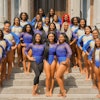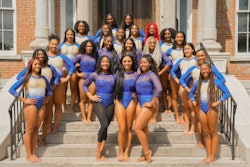Howard University and Morehouse College will renew their longstanding rivalry during the inaugural of the Nation’s Football Classic, which will be the first face-off between the schools in 15 years. The contest will be held annually in Washington, D.C., until 2013, with plans to recruit other HBCUs in the future.
For years, interest has been building for the matchup, says Andre Pattillo, Morehouse’s athletic director. As HBCUs with strong academic reputations, the schools are natural rivals.
“Because there’s such an underlying relationship between two schools, there’s been a cry for them to renew their relationship in athletic competition,” Pattillo says.
The idea for an annual game got backing from the Washington Convention and Sports Authority in Washington, D.C. WCSA will partner with the United Negro College Fund to sponsor the event, which will be held on Sept. 10 at 3:30 p.m. at RFK Stadium.
Pattillo says the game could be akin to the Bayou Classic, an annual matchup between two Southern HBCUs — Grambling State University and Southern University.
Such an event could give greater exposure to Morehouse’s athletic program, says Pattillo. As an NCAA Division II school, it’s often difficult for Morehouse to recruit top athletes.
“Sometimes, we miss out on students because they particularly want to be playing at a Division I level instead of at a Division II school,” he explains.
But the game’s impact will go well beyond the football field. Participating athletes will be led on an educational tour of D.C., and will be given a chance to meet local and national officials.
Erik Moses, WSCA’s senior vice president, says the decision to have the game in the District was the result of a perfect storm of interest and opportunity.
“The city’s demographics, all of the positive changes that have been made to D.C. in terms of its beautification — it’s cleaner, hipper, safer than it’s probably ever been,” says Moses.
The 2008 launch of the Military Bowl, another college football game held at RFK stadium, gave the WSCA considerable impetus to pursue this new project.
“It seemed like a no-brainer,” Moses says.
Moses isn’t sure about the game’s potential revenue, though according to some initial number-crunching from the WCSA, they expect anywhere from 25,000 to 30,000 visitors.
“There was no downside to doing this,” says Dr. Alvin Thornton, associate provost at Howard University. “It would be very difficult to find two schools who have contributed more in terms of leadership development than Howard and Morehouse.”
Both schools intend to use their clout to shed light on crucial problems within the Black community, particularly among males.
During game week, the United Negro College Fund will feature symposiums and lectures addressing issues such as low college enrollment among African-American males and health disparities among minorities.
When describing the game’s significance, Thornton uses a commonly heard refrain. “It’s not just a football game,” he says, “but it’s an opportunity, with the nation’s capital as a backdrop, to raise these issues that are important to the Black community.”
The schools will also try to reach out to students who aren’t in college, Thornton says.
“We must use events like these to enrich the pool of college-going students, especially in the African-American community,” he says.
Expectations about the game’s outcome? Thornton coyly offers one prediction.
“One of the teams will win,” he says. “Let’s just say, we expect good competition.”



















